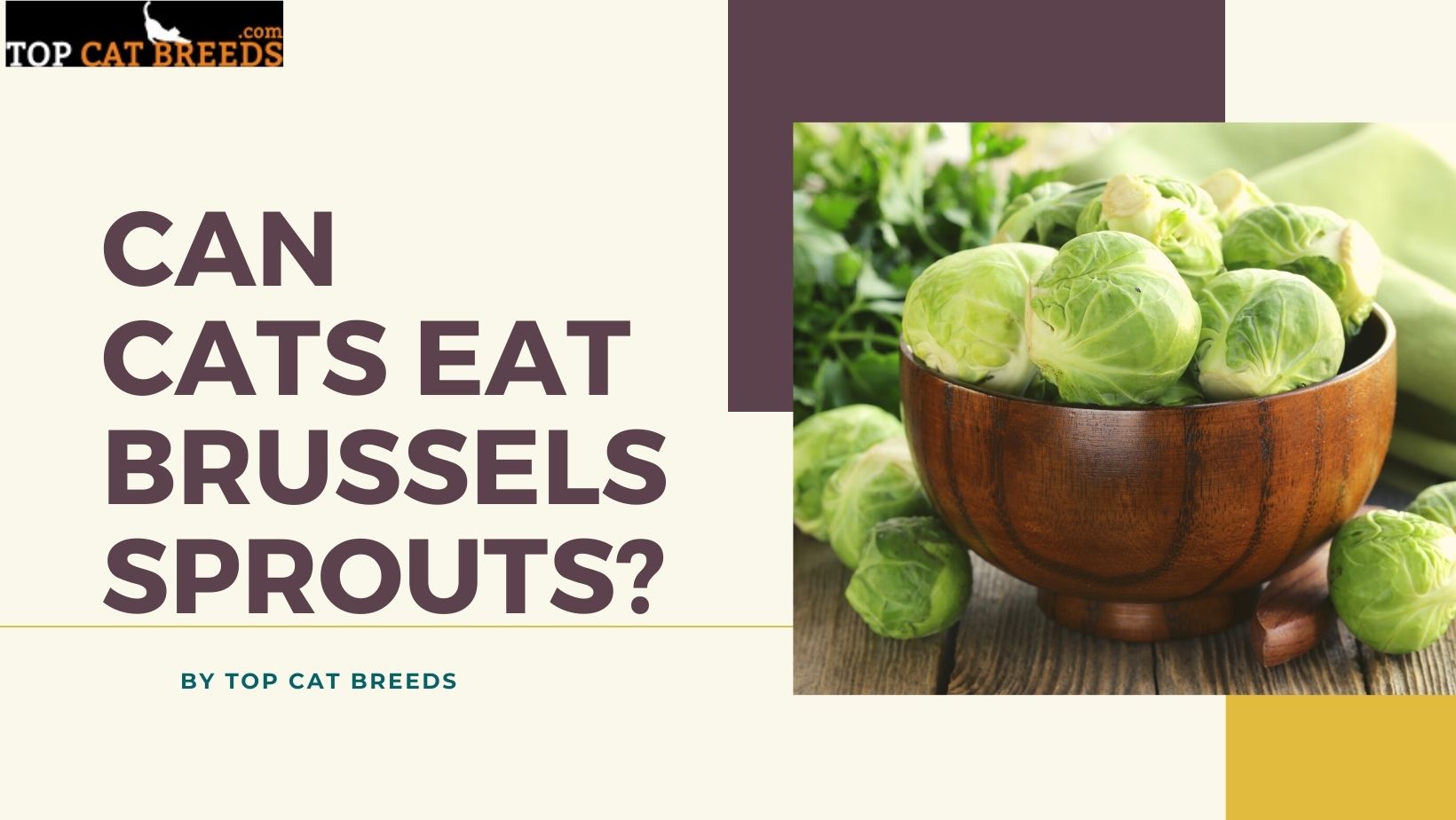
Cat food is mainly composed of meat and vegetables. Their primary source of nutrition is meat, while the other nutrients come from the green vegetables they eat.
Although cats can still eat sprouts, they regard these vegetables as mini-powerhouses of nutrients. Brussels sprouts are high in vitamin A and other nutrients.
These vegetables are also high in nutrients. They can be added to most meals and are a great addition to low-fat or pre-packaged meals.
Are Sprouts Toxic to Cats?
Since Brussels sprouts are known to be free of toxic substances, it is essential to note that they might not be as protected as other green vegetables. Aside from being grown in a warm and humid environment, they might also have different risks.
The amount of moisture used during the growth process helps keep the bacteria from growing into more dangerous forms. It ensures that food products are safe to eat.
It is essential to keep track of your cats’ health when eating Brussels sprouts. If they experience food poisoning, they should immediately seek medical attention.
Do Cats Like Brussels Sprouts?
When it comes to feeding your cat something new, keep in mind that they are not used to eating anything other than animal protein.
Some cats are known to eat human food just because it looks appetizing. However, they’ll still prefer meat to other food.
Read also: Can Cats Eat Pecans?
Can My Cat Eat Raw Brussels Sprouts?
Raw Brussels sprouts can cause food poisoning in cats. They can also lead to stomach pain and vomiting. Before eating them, check for other signs of illness such as fever and muscle aches.
Vomiting is a common symptom of food poisoning in cats. However, it’s also possible that your pet might not be sick. If they are showing signs, bring them to a trusted veterinarian.
Can My Cat Eat Cooked Brussels Sprouts?
Like humans, cats can eat cooked Brussels sprouts. However, they do not have the natural ability to break down plant cells.
To ensure that their meal is soft and digestible, we recommend that they prepare it in a crushed form. It’s also important to boil it to retain its natural softness.
What Are the Benefits of Brussels Sprouts for Cats?
Although Brussels sprouts are a great source of vitamin C and K, cats rarely consume them. Aside from being a significant source of various nutrients like vitamin C, brussels sprouts also contain other nutrients that help nourish the body. These include B Proteins and K, which can help prevent diarrhea and constipation.
An antioxidant is a substance that can help prevent harmful chemicals from entering the body. It can also help treat various chronic illnesses and lower cancer risk in cats.
The following are other benefits cats can get from eating brussels sprouts:
Aids With Digestion
High in dietary fiber, Brussels sprouts are known for supporting digestion. They are also prosperous in soluble and insoluble nutrients, contributing to a healthy gut.
The soluble fiber in cat food helps nourish the cat’s gut microbiota, which promotes digestion. Studies also suggest that soluble fiber can reduce the risk of cardiovascular disease and blood disorders in cats.
Insoluble fiber helps nourish and maintain a healthy digestive system by supporting the growth and retention of stool. It helps prevent constipation and improve bowel movement.
Promotes Weight Loss
Aside from helping digestion, eating Brussels sprouts can also help boost a cat’s energy level and prevent weight gain.
The fiber in Brussels sprouts helps keep a cat’s hunger at bay. It can also help lower the amount of food he consumes in one sitting. This benefit lasts for a long time.
Better Hydration
Like its cousins, Brussels sprouts are known for their high water content. A single serving of the vegetable can contain up to 86 grams of water.
Brussels is known to promote hydration. It can also help prevent dehydration in cats. For instance, adding Brussels to their food could help them drink more when they don’t drink enough water.
Faster Healing Process
Most cats spend about two-thirds of their waking hours sleeping. However, they tend to be very active during their waking hours. It could cause them to get injured while playing with their housemates.
Vitamin K found in Brussels sprouts can help heal wounds. It can stimulate the formation of blood clots, which can prevent bleeding.
It is known to stimulate the growth of healthy bones in cats. It can also help control the consequence of osteoporosis, which is a common condition in older animals.
Stabilizes Sugar Level
Brussels sprouts have a high concentration of carbohydrates and sugars. These sprouts have high fiber content, which helps minimize the effects of carbohydrate absorption. It contributes to the slow down of the absorption of sugars in the body.
Protects Cats From Other Diseases
You can also use Brussels sprouts to treat diabetes and other health conditions. It contains various antioxidant nutrients, which can protect against multiple diseases.
One of the most concentrated antioxidants in the body, vitamin C helps maintain the health of various tissues. It also assists in the display of collagen.
Brussels sprouts can also help boost the immune system. Follow the thumb rule when it comes to feeding Brussels sprouts to cats. It can cause kidney disease to worsen if it’s too much.
How Can I Prepare Brussels Sprouts for My Cat?
Over time, introducing Brussels sprouts to a cat’s diet can help improve its health. However, don’t mix them with other vegetables or fruits. One vegetable at a time can help you monitor the effects of introducing Brussels sprouts.
It’s essential to introduce brussels sprouts to your pet in a moderate amount to avoid triggering a diarrheal epidemic.
Prepare and feed Brussels sprouts in a crushed form to avoid accidentally choking a cat. It would help if you also boil them to retain their soft and chewy texture.
The easiest way to prepare Brussels sprouts is to remove the stems using a knife. Pick the nodes that are small and even in size. They should also be cleaned and washed thoroughly.
Read also: Can Cats Eat Spinach?
Frequently Asked Questions
Is It Safe for Cats to Have Brussels Sprouts?
Brussels sprouts are safe for cats, but you should only consume them in moderation. Aside from being toxic-free, they may not be as safe as other vegetables.
Brussels sprouts are prone to food-borne diseases due to their cultivation. They are usually grown in a warm and humid environment, creating a perfect setting for bacterial sporulation.
It’s essential to monitor your cats’ health before they start eating sprouts. If they begin to show signs of food poisoning, bring them to the vet to treat them immediately.
What Are the Things to Consider With Sprouts?
The cultivation of sprouts is prone to bacterial contamination. It is the most common health risk associated with them.
Raw sprouts are usually grown in a warm, wet environment. They can become contaminated with bacteria that can cause food poisoning. Most of the time, these bacteria are Salmonella and E. coli.
If your cat gets infected with bacteria, it will usually stay in its environment for around 2-10 days. It is the period before it can start displaying symptoms such as vomiting and diarrhea.
A self-limiting infection that doesn’t require medical intervention can last for 7-21 days.
If your cat gets infected with bacteria, you should treat them with Amoxicillin. It is a highly effective antibiotic that can treat gastrointestinal and skin infections.
Are Sprouts a Powerhouse for Cats?
Brussels sprouts are an excellent source of powerful nutrients for cats. You can add them to their food to provide a complete meal.
Aside from being high in nutrients, sprouts are also very versatile. You can add them to a variety of meals and snacks.
The article will also reveal the nutritional value of Brussels sprouts. It will include a variety of proteins, enzymes, and fibers.
Read this too: Can Cats Eat Radishes?
Conclusion
Although cats may not need sprouts for survival, they can still benefit from a healthy diet by adding them to their regular food.
Aside from being nutritious, sprouts also contain various nutrients and antioxidants that can help strengthen a cat’s immune system.
Since cats do not need to eat sprouts to survive, it is still essential to watch out for signs of food poisoning. However, even though giving them small amounts of nodes is safe, they should still be aware of their symptoms.

